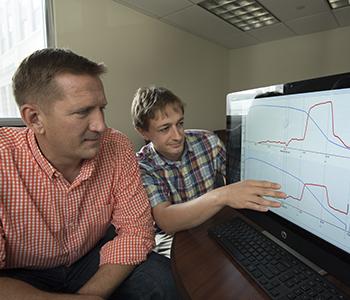The Biotechnology Calendar, Inc. BioResearch Product Faire™ will be returning to Washington University, St. Louis for its 19th Annual event. WashU's Life Science R&D Expenditures and NIH funding has been totaling about $1 Billion the past few years proving the University's dedication to being at the forefront of life science research and providing a prime opportunity for boosting scientific sales.
Read MoreTags: Washington University St. Louis, Washington University, WashU, MO, St Louis, 2018
Chemical bioengineers find and create bacteria for several different purposes, such as eating chlorine and consuming toxic byproducts of biodiesel plants. A closer look at these bacterial communities undertaken in a study at Washington University in St. Louis shows that there is actually a division of labor between bacterial workers and layabouts.
Read MoreTags: WashU, BioResearch Product Faire Event, MO, St Louis, Washington Univsersity St. Louis, 2016
The National Institutes of Health (NIH) recently launched a new network of institutions - called the Centers for Common Disease Genomics (CCDG) - which will study common conditions such as heart disease, stroke, diabetes, and autism to see how genetics and DNA contribute to the risk of these diseases. The McDonnell Genome Institute at Washington University in St. Louis is one of four institutions involved in this network and will be receiving $60 million over the next four years to study genomics and common diseases.
Read MoreTags: Washington University St. Louis, Midwest, Missouri, WashU, heart disease, Diabetes, Autism, BioResearch Product Faire Event, MO, St Louis, NIH funding, 2016, Centers for Common Disease Genomics, stroke, CCDG
For years, we’ve been discussing reasons not to use antibiotics and have seen the development of new alternatives, such as spray-on antibodies and internal bacterial combustion. Despite this, antibiotics continue to be widely used today. Scientists at Washington University in St. Louis theorize that antibiotics are here to stay, but perhaps it is the definition of antibiotics that needs to be changed.
Read MoreTags: Washington University St. Louis, WashU, BioResearch Product Faire Event, MO, St Louis, 2016

Multiple myeloma is a rare form of cancer that affects the immune system in about 0.7% of Americans. According to the American Cancer Society, approximately 26,850 new cases were expected to be diagnosed in 2015, and 11,240 deaths were expected to occur. Although there are treatments available to fight this cancer, patients frequently relapse, demonstrating the need for new treatments.
Read MoreTags: Washington University St. Louis, Midwest, WashU, St. Louis Bioresearch Product Faire Event, cancer research, Cancer Treatment, MO, St Louis, new funding, 2016, BioResearch Product Faire, Multiple Myeloma
 Life science research institutions around the country are constantly expanding and providing more space and opportunity for researchers to conduct their work. Recently, Baylor St. Luke's at the Texas Medical Center announced the construction of a new medical campus that was underway and UGA opened a new Veterinary Research Center earlier this year. Washington University in St. Louis is also expanding research space, with a newly opened Center for Regenerative Medicine.
Life science research institutions around the country are constantly expanding and providing more space and opportunity for researchers to conduct their work. Recently, Baylor St. Luke's at the Texas Medical Center announced the construction of a new medical campus that was underway and UGA opened a new Veterinary Research Center earlier this year. Washington University in St. Louis is also expanding research space, with a newly opened Center for Regenerative Medicine.
Tags: Midwest, Washington University, WashU, Regenerative Medicine, MO, St Louis, New research center, 2016, BioResearch Product Faire
There are many solutions to the challenge of producing food for an ever-growing human population. One approach is to simply produce more food; we have seen successes on this front from research teams at the University of Wisconsin, Madison and the University of Illinois, Urbana-Champaign. Another approach, proposed by biologists at Washington University, St. Louis, attempts to increase quality over quantity, increasing nutrient content in existing crops.
Read MoreTags: Washington University in St. Louis, 2015, BioResearch Product Faire Event, MO, St Louis, UWash
Our immune system is our best defense against sickness on a day-to-day basis, and bioresearchers have been trying to ramp it up to handle bigger threats for some time now. A research lab from MSU found that fish oil can significantly boost immune activity, and a UCSF team discovered genetic “enhancers” that help prevent autoimmune diseases. At the Washington University in St. Louis, scientists are finding that our immune system has the potential to be much stronger and are discovering how to tap into that potential.
Read MoreTags: Washington University St. Louis, WashU, 2015, BioResearch Product Faire Event, MO, St Louis
A rational approach to tackling diabetes using life science research is to focus on insulin. We’ve seen a research team at Emory University transplant insulin-producing cells, and we’ve reported on an Urbana-Champaign team trying to release insulin in patients’ cells. Now researchers at Washington University at St. Louis are taking a new approach by directly reducing blood sugar without the use of insulin.
 Brian Finck (image left, courtesy WUSTL) believes that rather than rely on insulin to lower blood sugar in patients with diabetes, it’s easier to cut out the middle man and reduce glucose levels using genetics. He and fellow WUSTL professor Kyle McCommis found that shutting down a particular liver protein dramatically reduced glucose production in the liver.
Brian Finck (image left, courtesy WUSTL) believes that rather than rely on insulin to lower blood sugar in patients with diabetes, it’s easier to cut out the middle man and reduce glucose levels using genetics. He and fellow WUSTL professor Kyle McCommis found that shutting down a particular liver protein dramatically reduced glucose production in the liver.
“We think this strategy could lead to more effective drugs for type 2 diabetes,” says Finck, who is an associate professor of medicine in the Division of Geriatrics and Nutritional Science. “A drug that shuts down glucose production has the potential to help millions of people affected by the most common form of diabetes.”

(Brian N. Finck, PhD (left), and Kyle S. McCommis, PhD analyze blood sugar levels to evaluate their new strategy. Image courtesy WUSTL)
The team has already initiated clinical trials using the drug compound MSDC-0602. So far, the drugs have been successful in inhibiting the protein and reducing blood sugar levels. Dr. Finck is working with the biopharmaceutical company Metabolic Solutions Development Co. to facilitate production of the drug.
Funding for this research came from the National Institute of Diabetes and Digestive and Kidney Diseases and the National Institute on Alcohol Abuse and Alcoholism of the National Institutes of Health as well as the Foundation for Barnes-Jewish Hospital and the Robert A.Welch Foundation. For additional information about funding for research at Washington University in St. Louis, read our free WUSTL Funding Statistics Report, available via the link below:
Read MoreTags: WashU, Washington University in St. Louis, 2015, BioResearch Product Faire Event, MO, St Louis
One of the most pressing pursuits in bioscience is increasing agricultural production. The Food and Agriculture Organization estimates that, as a planet, we need to produce 70 percent more food by the year 2050 in order to keep up with increasing population. We have already shone our spotlight on several university research teams who are tackling this problem, like the UW team attempting to increase flowering rates and the UIUC team who spliced algae genes to increase photosynthesis. Now we look to Washington University in St. Louis for some novel ideas about optimizing photosynthesis.
Read MoreTags: WashU, Washington University in St. Louis, 2015, BioResearch Product Faire Event, MO, St Louis

